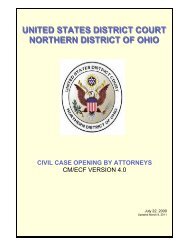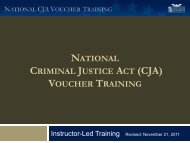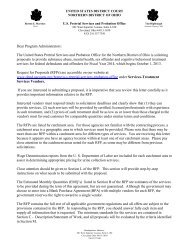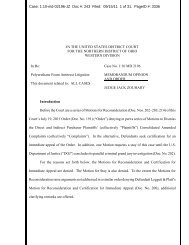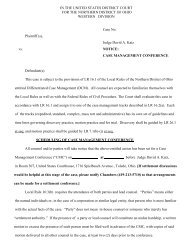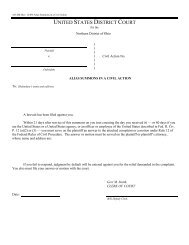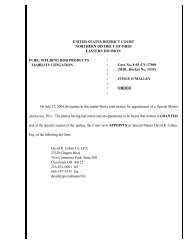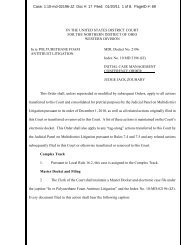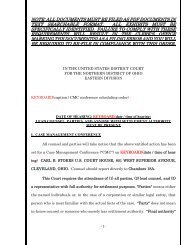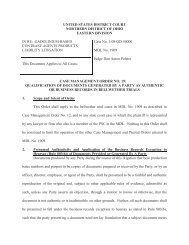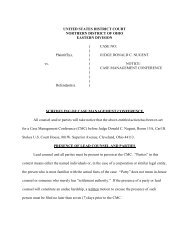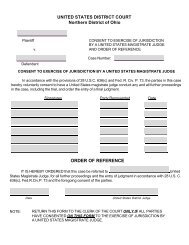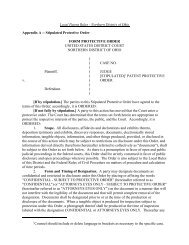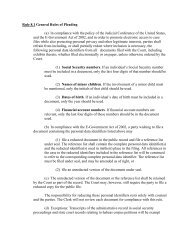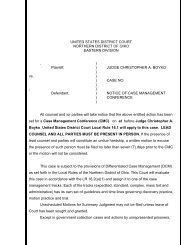First Amended Order No. 7 - Northern District of Ohio
First Amended Order No. 7 - Northern District of Ohio
First Amended Order No. 7 - Northern District of Ohio
You also want an ePaper? Increase the reach of your titles
YUMPU automatically turns print PDFs into web optimized ePapers that Google loves.
UNITED STATES DISTRICT COURT<br />
NORTHERN DISTRICT OF OHIO<br />
IN RE: ) MDL Docket <strong>No</strong>. 1953<br />
)<br />
HEPARIN PRODUCTS ) CHIEF JUDGE JAMES G. CARR<br />
LIABILITY LITIGATION ) CASE NO. 1:08-60000<br />
)<br />
) ALL CASES<br />
<strong>First</strong> <strong>Amended</strong> Pretrial <strong>Order</strong> <strong>No</strong>. 7<br />
PROTECTIVE ORDER<br />
WHEREAS, the parties in the above-entitled action, believe that parties and non-parties may be<br />
asked to produce documents, provide testimony or otherwise supply information that contains<br />
trade secrets, confidential or proprietary information in connection with discovery in the aboveentitled<br />
litigation; and<br />
WHEREAS, the parties believe that it is appropriate for this Court to issue a protective order to<br />
permit the disclosure <strong>of</strong> such trade secret, confidential or proprietary information in connection<br />
with the above-entitled litigation, but to protect that information from public disclosure;<br />
IT IS HEREBY STIPULATED AND AGREED by and between plaintiffs and defendants Baxter<br />
International Inc., Baxter Healthcare Corporation, Baxter Healthcare Corporation <strong>of</strong> Puerto Rico,<br />
and Scientific Protein Laboratories LLC, Changzhou SPL Co., Ltd., through their respective<br />
Lead and Liaison Counsel, that, during this action, with respect to the disclosure <strong>of</strong> any<br />
information, documents or things obtained by any party to this action, where such items are<br />
asserted to contain or comprise trade secret, confidential, or proprietary information, the following<br />
procedures shall be employed and the following restrictions shall govern:<br />
1. Definitions: For purposes <strong>of</strong> this Protective <strong>Order</strong>, the following definitions shall apply:<br />
(a) The term “document” shall mean each and every writing within the<br />
meaning <strong>of</strong> Rule 1001 <strong>of</strong> the Federal Rules <strong>of</strong> Evidence, and shall consist <strong>of</strong> letters,
words, or numbers, or their equivalent, set down by handwriting, typewriting, printing,<br />
photostating, photographing, magnetic impulse, mechanical or electronic recording, or<br />
other form <strong>of</strong> data compilation.<br />
(b) The term “Disclosing Party” is defined herein as any party or nonparty<br />
who is requested to produce or produces documents, materials or testimony<br />
containing CONFIDENTIAL INFORMATION.<br />
(c) The term “Receiving Party” is defined herein as any party to whom<br />
documents, materials or testimony containing CONFIDENTIAL INFORMATION is<br />
provided.<br />
(d)<br />
The term “CONFIDENTIAL INFORMATION” is defined herein as trade<br />
secrets, or other confidential or proprietary research, development, manufacturing, sales,<br />
marketing, or commercial or business information, including customer names;<br />
proprietary licensing, distribution, sales, marketing, design, development, research,<br />
and manufacturing information—not publicly filed with any federal or state<br />
regulatory authority—regarding products and medicines, whether currently marketed or<br />
under development; clinical studies not publicly filed with any federal or state regulatory<br />
authority; information concerning competitors; production information; personnel records<br />
and information; financial information not publicly filed with any federal or state<br />
regulatory authority, and personal medical information.<br />
(e) “Outside Service Organization” is defined herein as an individual or<br />
organization that provides photocopying, document processing, translation, jury or<br />
trial consulting, or graphics services to counsel as part <strong>of</strong> discovery or preparation and<br />
trial <strong>of</strong> this action.<br />
(f) “Support Staff” is defined herein as employees <strong>of</strong> counsel for the parties<br />
or their Consultants, including paralegals, clerical personnel and secretarial personnel.<br />
2. Applicability <strong>of</strong> Protective <strong>Order</strong>: If, in the course <strong>of</strong> this litigation, a party undertakes<br />
or is caused to disclose what the Disclosing Party contends is CONFIDENTIAL<br />
INFORMATION, the procedures set forth herein shall be employed and the disclosure there<strong>of</strong><br />
shall be subject to this Protective <strong>Order</strong>. CONFIDENTIAL INFORMATION shall be used<br />
solely in the preparation, prosecution or trial <strong>of</strong> this litigation.
3. Other Cases: By entering this <strong>Order</strong> and limiting the disclosure <strong>of</strong> information in this<br />
litigation, the Court does not intend to preclude another court from finding that information<br />
may be relevant and subject to disclosure in another case. Any person or party subject to this<br />
<strong>Order</strong> who becomes subject to a motion to disclose another party’s information designated under<br />
one <strong>of</strong> the categories <strong>of</strong> confidentiality pursuant to this <strong>Order</strong>, shall promptly notify that party<br />
<strong>of</strong> the motion so that the party may have an opportunity to appear and be heard on whether that<br />
information should be disclosed.<br />
4. Disclosure Prohibited: CONFIDENTIAL INFORMATION or the substance or context<br />
there<strong>of</strong>, including any notes, memoranda or other similar documents relating thereto, shall not be<br />
disclosed or summarized, either in writing or orally, by a Receiving Party to anyone other than<br />
persons permitted to have access to such information under this <strong>Order</strong>. <strong>No</strong>thing in this<br />
Protective <strong>Order</strong> shall limit disclosure or use by a designating party <strong>of</strong> its own CONFIDENTIAL<br />
INFORMATION.<br />
5. Designating and Marking Confidential Material: Materials to be designated<br />
“CONFIDENTIAL” pursuant to this Protective <strong>Order</strong> shall be designated and marked as follows:<br />
(a) Documents: Documents may be designated as “CONFIDENTIAL” by placing<br />
the following legend, or equivalent there<strong>of</strong>, on any such document:<br />
“CONFIDENTIAL”<br />
Such legend shall be placed upon every page <strong>of</strong> each document containing<br />
CONFIDENTIAL INFORMATION. In lieu <strong>of</strong> marking the originals <strong>of</strong> documents, the party<br />
may mark the copies that are produced or exchanged.<br />
(b) <strong>No</strong>n-Paper Media: Where CONFIDENTIAL INFORMATION is produced in a<br />
non-paper medium (e.g., video tape, audio tape, computer disks, etc.), the appropriate<br />
confidentiality notice as described in 5(a) above should be placed on the medium, if possible,<br />
and its container, if any, so as to clearly give notice <strong>of</strong> the designation. To the extent that any<br />
Receiving Party prints any <strong>of</strong> the information contained on non-paper media that is designated as<br />
containing CONFIDENTIAL INFORMATION, such printouts will be marked as described in <br />
5(a) above by the Receiving Party.<br />
(c) Physical Exhibits: The confidential status <strong>of</strong> a physical exhibit shall be indicated<br />
by placing a label on said physical exhibit with the appropriate confidentiality notice as<br />
3
described in 5(a) above.<br />
(d) Written Discovery: In the case <strong>of</strong> CONFIDENTIAL INFORMATION<br />
incorporated in answers to interrogatories or responses to requests for admission, the appropriate<br />
confidentiality notice as described in 5(a) above shall be placed only on the first page <strong>of</strong> the<br />
document and on each answer or response that actually contains CONFIDENTIAL<br />
INFORMATION.<br />
6. Deposition Proceedings: Counsel for the parties agree that the Designating Party shall<br />
make a good faith effort to designate as “CONFIDENTIAL” those specific portions <strong>of</strong> a<br />
deposition transcript that contain CONFIDENTIAL INFORMATION. The entire transcript <strong>of</strong> a<br />
deposition shall be treated as CONFIDENTIAL until 30 days after receipt <strong>of</strong> the deposition<br />
transcript by counsel for the witness, after which the information revealed during the deposition<br />
shall cease to be treated as CONFIDENTIAL unless, at the deposition and on the record, or in<br />
writing before the 30 days have expired, the witness, his or her employer or his or her counsel<br />
designate those portions <strong>of</strong> the deposition transcript (including exhibits) as “CONFIDENTIAL.”<br />
In the case <strong>of</strong> non-party witnesses, any party or the non-party witness, his or her employer, or<br />
his or her counsel may designate information revealed as CONFIDENTIAL INFORMATION<br />
either by a statement to such effect on the record in the course <strong>of</strong> the deposition, or in writing<br />
within 30 days <strong>of</strong> receipt <strong>of</strong> the deposition by the non-party witness’ counsel.<br />
Counsel for any Disclosing Party shall have the right to exclude from oral depositions, other than<br />
the deponent, deponent’s counsel, the reporter, and videographer (if any), any person who is not<br />
authorized by this Protective <strong>Order</strong> to receive documents or information designated<br />
“CONFIDENTIAL.” Such right <strong>of</strong> exclusion shall be applicable only during periods <strong>of</strong><br />
examination or testimony directed to or comprising CONFIDENTIAL INFORMATION <strong>of</strong> the<br />
Disclosing Party.<br />
With regard to designations made within thirty (30) days after receipt <strong>of</strong> the deposition<br />
transcript <strong>of</strong> a deposition, counsel shall make such designations by sending written notice to the<br />
Court Reporter, to counsel for the parties, and to any other person known to have a copy <strong>of</strong><br />
said transcript. The notice shall reference this Protective <strong>Order</strong>, identify the appropriate level
<strong>of</strong> confidentiality, and identify the pages and/or exhibits so designated. All copies <strong>of</strong> transcripts<br />
designated in this fashion shall be marked with a notice indicating the appropriate level <strong>of</strong><br />
confidentiality <strong>of</strong> the material and shall be governed by the terms <strong>of</strong> this Protective <strong>Order</strong>.<br />
7. Designating Inspections <strong>of</strong> Documents and Tangible Items: Where discovery is<br />
provided by allowing access to the documents or tangible things for inspection instead <strong>of</strong><br />
delivering copies <strong>of</strong> them, all items being inspected shall be deemed CONFIDENTIAL<br />
INFORMATION until the party allowing access to them indicates otherwise in writing or<br />
delivers copies <strong>of</strong> them to the party seeking discovery with no “CONFIDENTIAL”<br />
designation, in which case the provisions <strong>of</strong> paragraph 8 shall also apply. If a party believes that<br />
inspection, measuring, testing, sampling, or photographing <strong>of</strong> that party’s processes, products,<br />
equipment, premises, or other property pursuant to Rule 34 <strong>of</strong> the Federal Rules <strong>of</strong> Civil<br />
Procedure will reveal or disclose information that is in good faith deemed CONFIDENTIAL<br />
INFORMATION, that party shall advise in advance the party seeking such discovery that<br />
the inspection, measuring, testing, sampling, or photographing will be permitted only on a<br />
confidential basis, and that the information discovered, and any information derived from that<br />
information, shall be treated as CONFIDENTIAL INFORMATION.<br />
8. Inadvertent <strong>No</strong>ndesignation: The failure to designate CONFIDENTIAL<br />
INFORMATION as “CONFIDENTIAL” before or at the time <strong>of</strong> disclosure shall not operate as a<br />
waiver <strong>of</strong> a Disclosing Party’s right to designate said information as “CONFIDENTIAL.” In the<br />
event that CONFIDENTIAL INFORMATION is designated as “CONFIDENTIAL” after<br />
disclosure, a Receiving Party shall employ reasonable efforts to ensure that all such<br />
information is subsequently treated as “CONFIDENTIAL” pursuant to the terms <strong>of</strong> this<br />
Protective <strong>Order</strong>. Disclosure <strong>of</strong> such CONFIDENTIAL INFORMATION to persons not<br />
authorized to receive that information before receipt <strong>of</strong> the confidentiality designation shall not<br />
be deemed a violation <strong>of</strong> this Protective <strong>Order</strong>. However, in the event the document has been<br />
distributed in a manner inconsistent with the designation, a Receiving Party will take the steps<br />
reasonably necessary to conform distribution to the designation: i.e., returning all copies <strong>of</strong> the<br />
“CONFIDENTIAL” document, or notes or extracts there<strong>of</strong>, to the persons authorized to<br />
5
possess such documents. In the event distribution has occurred to a person not under the<br />
control <strong>of</strong> a Receiving Party, a request for return <strong>of</strong> the document, and for an undertaking <strong>of</strong><br />
confidentiality, shall be made in writing. In the event the request is not promptly agreed to in<br />
writing, or in the event there is no response, or in the event that the party deems the making <strong>of</strong><br />
the request to be a futile act, the party shall promptly notify the Disclosing Party <strong>of</strong> the<br />
distribution and all pertinent facts concerning it, including the identity <strong>of</strong> the person or entity not<br />
under the control <strong>of</strong> the Receiving Party.<br />
9. Misdesignation: A Disclosing Party will use reasonable efforts to avoid designating, or<br />
to de-designate in a reasonable time after request, any document or information as<br />
“CONFIDENTIAL” that is not entitled to such designation or that is generally available to the<br />
public.<br />
10. Challenging Designation <strong>of</strong> Materials: Any Receiving Party disagreeing with the<br />
designation <strong>of</strong> any document or information as “CONFIDENTIAL” shall notify the Disclosing<br />
Party in writing. The Disclosing Party shall then have a reasonable period, not exceeding thirty<br />
(30) days, from the date <strong>of</strong> receipt <strong>of</strong> such notice to: (1) advise the Receiving Party whether or<br />
not the Disclosing Party persists in such designation; and (2) if the Disclosing Party persists<br />
in the designation, to explain the reasons for the particular designation. The Receiving Party<br />
may then, after advising the Disclosing Party, move the Court for an order removing the<br />
particular designation and replacing it with a different designation or no designation. The<br />
designating party who asserts that the document or information is “CONFIDENTIAL” shall<br />
have the burden <strong>of</strong> proving that the designation is proper. Information designated<br />
“CONFIDENTIAL” by a Disclosing Party shall be treated as such by a Receiving Party unless<br />
otherwise agreed to by the parties or otherwise ordered by the Court or by any appellate court,<br />
should appellate review be sought.<br />
The failure <strong>of</strong> a Receiving Party to expressly challenge a claim <strong>of</strong> confidentiality or the<br />
designation <strong>of</strong> any document or information as “CONFIDENTIAL” at the time <strong>of</strong> disclosure<br />
shall not constitute a waiver <strong>of</strong> the right to assert at any subsequent time that the same is not in<br />
fact confidential or not an appropriate designation for any reason.<br />
11. Access to CONFIDENTIAL INFORMATION: Access to CONFIDENTIAL
INFORMATION shall be limited to (a) the parties and witnesses and prospective witnesses <strong>of</strong><br />
a Party who have a need to know the information to assist counsel in connection with the<br />
litigation; (b) outside counsel for the respective parties, including counsel’s Support Staff and<br />
Outside Service Organizations; (c) in-house counsel for the respective parties, including inhouse<br />
counsel’s Support Staff and Outside Service Organizations; (d) the parties’ insurers,<br />
including the insurers’ Support Staff and Service Organizations; (e) court reporters taking<br />
testimony and their support personnel; (f) deposition videographers recording testimony and<br />
their support personnel; (g) the Court and any authorized court personnel; (h) independent<br />
consultants or experts retained by counsel for assistance with respect to this litigation; (i)<br />
counsel for a potential Plaintiff who has executed a Participation Agreement in accordance<br />
with PTO #6 and Exhibit A attached hereto, together with each such person’s Support Staff<br />
and Service Organizations; and (j) counsel for any Plaintiff, or any unrepresented Plaintiff, in<br />
a state court proceeding who has executed a Participation Agreement in accordance with<br />
Pretrial <strong>Order</strong> <strong>No</strong>. 6 and Exhibit A attached hereto, together with such person’s Support Staff<br />
and Service Organizations. Prior to disclosure <strong>of</strong> Confidential Material to any consultant or<br />
experts, they shall be informed <strong>of</strong> the provisions <strong>of</strong> this <strong>Order</strong>, read this <strong>Order</strong>, and execute<br />
the Agreement attached hereto as Exhibit A. Furthermore, in the event that a Receiving<br />
Party intends to disclose CONFIDENTIAL INFORMATION to any employee,<br />
independent consultant, expert or any other agent who is currently employed by any entity<br />
that is or was in the last five years a competitor <strong>of</strong> any SPL or Baxter related entity in the<br />
manufacture, marketing, purchase or sale <strong>of</strong> heparin products, that party shall provide notice<br />
by facsimile to counsel for the Disclosing Party at least ten (10) business days prior to allowing<br />
the employee, independent consultant, expert, or any other agent access to confidential material<br />
subject to this Protective <strong>Order</strong>. Such written notice shall include the person’s name, a copy <strong>of</strong><br />
the person’s curriculum vitae, information concerning the person’s employment<br />
responsibilities and work with defendants’ competitor or customer, identification <strong>of</strong> the type<br />
<strong>of</strong> information to which access is required, a brief statement as to why such access is necessary,<br />
and a signed copy <strong>of</strong> the agreement attached hereto as Exhibit A (if appropriate, modified as<br />
necessary to narrow the scope <strong>of</strong> access requested). The Disclosing Party shall have ten (10)<br />
days after mailing (via overnight delivery) the above-described information to object in<br />
writing to such disclosure. Pending resolution <strong>of</strong> any informal or formal petition for<br />
7
disclosure, no disclosure shall be made to such person. If the Disclosing Party who so<br />
designated the documents refuses to give its consent, the disclosing and receiving parties shall<br />
confer to attempt to resolve the reasons for withholding consent. If an agreement cannot be<br />
reached, the Disclosing or Receiving Party desiring disclosure <strong>of</strong> the CONFIDENTIAL<br />
INFORMATION may petition the Court for an order granting or prohibiting disclosure. The<br />
Disclosing Party shall bear the burden <strong>of</strong> demonstrating that disclosure is inappropriate upon<br />
any such petition. Prior to disclosure <strong>of</strong> Confidential Material to any such person, they shall be<br />
informed <strong>of</strong> the provisions <strong>of</strong> this <strong>Order</strong>, read this <strong>Order</strong>, and execute the Agreement attached<br />
hereto as Exhibit A.<br />
12. <strong>No</strong>thing herein is intended to prevent showing a document designated as<br />
“CONFIDENTIAL” to a person who the document indicates is an author or authorized recipient <strong>of</strong><br />
the document. <strong>No</strong> copies <strong>of</strong> such documents shall be given to such individuals for them to retain.<br />
Furthermore, if a document or testimony makes reference to the actual or alleged conduct or<br />
statements <strong>of</strong> a person who is a potential witness, the discussion by counsel <strong>of</strong> such conduct or<br />
statements with such witness (without revealing any portion <strong>of</strong> the document or testimony) shall not<br />
constitute a disclosure in violation <strong>of</strong> this Protective <strong>Order</strong>. Prior to disclosure <strong>of</strong> CONFIDENTIAL<br />
INFORMATION to any such witness who is not a current employee or <strong>of</strong>ficer <strong>of</strong> the Disclosing<br />
Party, the witness shall be informed <strong>of</strong> the provisions <strong>of</strong> this <strong>Order</strong>, read this <strong>Order</strong>, and execute the<br />
Agreement attached hereto as Exhibit A. <strong>No</strong>twithstanding the foregoing, during deposition or trial<br />
testimony, counsel may disclose documents produced by a party to current employees or <strong>of</strong>ficers <strong>of</strong><br />
the Disclosing Party.<br />
13. Court Reporters and Videographers: Any court reporter or videographer who records<br />
testimony in this action at a deposition shall be provided with a copy <strong>of</strong> this Protective <strong>Order</strong> by<br />
the party noticing the deposition. That party shall advise the court reporter or videographer,<br />
before any testimony is taken, that all documents, information, or testimony designated<br />
“CONFIDENTIAL” is and shall remain confidential and shall not be disclosed except as<br />
provided in this Protective <strong>Order</strong>. The noticing party shall further advise the court reporter and<br />
videographer that copies <strong>of</strong> all transcripts, reporting notes and all other records <strong>of</strong> any such<br />
testimony must be treated in accordance with this Protective <strong>Order</strong>, delivered to attorneys <strong>of</strong>
ecord, or filed under seal with the Court.<br />
14. Filing Under Seal: <strong>No</strong> party shall file with the Court any papers that contain or<br />
reference CONFIDENTIAL INFORMATION <strong>of</strong> any other party or non-party unless that party<br />
concurrently files a written application to seal those papers and a proposed order thereon. The<br />
parties shall cooperate with each other in taking steps to file CONFIDENTIAL INFORMATION<br />
under seal, including, when appropriate, joining in or consenting to motions to file under seal<br />
filed by another party. If a filing under seal is requested, a written application and a proposed<br />
order shall be presented to the judge along with the document submitted for filing under seal.<br />
The original and judge’s copy <strong>of</strong> the document shall be sealed in separate envelopes with a<br />
copy <strong>of</strong> the title page attached to the front <strong>of</strong> each envelope. Conformed copies need not be<br />
placed in sealed envelopes.<br />
15. Storage <strong>of</strong> Confidential Materials: The Receiving Party shall use due care with<br />
respect to the storage, custody, use and/or dissemination <strong>of</strong> CONFIDENTIAL<br />
INFORMATION. CONFIDENTIAL INFORMATION shall not be stored at any business<br />
premises <strong>of</strong> the Receiving Party unless such information is stored in a reasonably secured area<br />
and accessible only to persons eligible to review such information.<br />
16. Disclosure–Special Cases: If an attorney for any Receiving Party desires to give, show,<br />
make available or communicate any document or information designated “CONFIDENTIAL”<br />
to a person not authorized by paragraph 11 to receive such documents, the attorney must first<br />
provide written notice <strong>of</strong> that person’s name, an identification <strong>of</strong> the type <strong>of</strong> information to<br />
which access is required, a brief statement as to why such access is necessary, and a signed copy<br />
<strong>of</strong> the agreement attached hereto as Exhibit A (if appropriate, modified as necessary to<br />
narrow the scope <strong>of</strong> access requested). The Disclosing Party shall have ten (10) days after mailing<br />
(via overnight delivery) the above-described information to object in writing to such<br />
disclosure. Pending resolution <strong>of</strong> any informal or formal petition for disclosure, no disclosure<br />
shall be made to such person. If the Disclosing Party who so designated the document<br />
refuses to give its consent, the disclosing and receiving parties shall confer to attempt to resolve<br />
the reasons for withholding consent. If an agreement cannot be reached, the Disclosing or<br />
9
Receiving Party desiring disclosure <strong>of</strong> the CONFIDENTIAL INFORMATION may petition<br />
the Court for an order granting or prohibiting disclosure. The Disclosing Party shall bear the<br />
burden <strong>of</strong> demonstrating that disclosure is inappropriate upon any such petition.<br />
17. Copies <strong>of</strong> Confidential Materials: <strong>No</strong>thing herein shall restrict a qualified recipient<br />
from making working copies, abstracts, digests and analyses <strong>of</strong> such information for use in<br />
connection with this litigation, and such working copies, abstracts, digests and analyses shall be<br />
deemed to have the same level <strong>of</strong> protection under the terms <strong>of</strong> this <strong>Order</strong>. Further, nothing<br />
herein shall restrict a qualified recipient from converting or translating such information into<br />
machine-readable form for incorporation in a data retrieval system used in connection with this<br />
litigation, provided that access to such information, whatever form stored or reproduced, shall be<br />
limited to qualified recipients.<br />
18. Custody <strong>of</strong> Confidential Materials: Documents or information designated<br />
“CONFIDENTIAL” shall be maintained in the custody <strong>of</strong> counsel for the parties except that: (a)<br />
any court reporter who transcribes testimony given in this action may maintain any such<br />
designated documents for the purpose <strong>of</strong> rendering his or her normal transcribing services;<br />
and (b) partial or complete copies <strong>of</strong> these documents may be retained by persons entitled to<br />
access <strong>of</strong> such documents under the terms <strong>of</strong> this <strong>Order</strong> to the extent necessary for their study,<br />
analysis and preparation <strong>of</strong> the case. A person with custody <strong>of</strong> documents designated<br />
“CONFIDENTIAL” shall maintain them in a manner that limits access to those persons entitled<br />
under this <strong>Order</strong> to examine the documents so designated.<br />
19. Procedure in Event <strong>of</strong> <strong>No</strong>n-Permitted Disclosure: Should any document or<br />
information designated as “CONFIDENTIAL” be disclosed, through inadvertence or<br />
otherwise, to any person or party not authorized under this <strong>Order</strong>, then the party responsible<br />
for the inadvertent disclosure shall use its best efforts to bind such person to the terms <strong>of</strong> this<br />
<strong>Order</strong>; and shall (a) promptly inform such person <strong>of</strong> all the provisions <strong>of</strong> this <strong>Order</strong>; (b) request<br />
such person to sign the agreement in the form attached hereto as Exhibit A; and (c) identify<br />
such person immediately to the Disclosing Party that designated the document as confidential. The<br />
executed agreement shall promptly be served upon the party that designated the document as
confidential.<br />
20. Limited Scope: The purpose <strong>of</strong> this <strong>Order</strong> is to facilitate discovery in this litigation, and<br />
in no manner shall it affect the application <strong>of</strong> any state or federal law regarding confidentiality <strong>of</strong><br />
information.<br />
21. Continuing Force and Effect: The terms <strong>of</strong> this <strong>Order</strong> shall remain in force and effect<br />
after termination <strong>of</strong> this action unless modified, superseded, or terminated by the agreement <strong>of</strong><br />
the parties or by order <strong>of</strong> the Court.<br />
22. <strong>No</strong> Waiver <strong>of</strong> Privilege or Work Product: The terms <strong>of</strong> this <strong>Order</strong> shall in no way<br />
affect a Disclosing Party’s right to (a) withhold information on grounds <strong>of</strong> immunity from<br />
discovery such as, for example, attorney-client privilege or the attorney work-product<br />
doctrine, or (b) reveal or disclose to anyone any documents or information designated by that<br />
party as “CONFIDENTIAL” and containing no information designated by another party or third<br />
party as “CONFIDENTIAL.”<br />
23. <strong>No</strong> Application to Public or Otherwise Available Information: The restrictions and<br />
obligations set forth herein relating to information designated “CONFIDENTIAL” shall not<br />
apply to any information which: (a) the parties agree, or the Court rules, is already public<br />
knowledge; (b) the parties agree, or the Court rules, has become public knowledge other than<br />
as a result <strong>of</strong> disclosure by a Receiving Party, its employees or agents in violation <strong>of</strong> this<br />
Protective <strong>Order</strong>; or (c) has come or shall come into a Receiving Party’s legitimate<br />
possession independently <strong>of</strong> the Disclosing Party. Such restrictions and obligations shall not be<br />
deemed to prohibit discussions with any person <strong>of</strong> any information designated<br />
“CONFIDENTIAL” if that person already has or obtains legitimate possession there<strong>of</strong>.<br />
24. Conclusion <strong>of</strong> Litigation: Unless undersigned counsel agree otherwise in writing,<br />
within ninety (90) days <strong>of</strong> the final disposition <strong>of</strong> this action including any appeals, the attorneys<br />
for the parties shall return promptly to the Disclosing Party from whom they were obtained, all<br />
documents which have been designated “CONFIDENTIAL” or destroy same; and return or<br />
destroy all copies made there<strong>of</strong>, including all documents, or copies provided by a Receiving<br />
Party to any other person. <strong>No</strong>twithstanding the foregoing, counsel for the parties shall be<br />
permitted to retain a file copy <strong>of</strong> materials created by counsel, their Support Staff or Outside<br />
11
Service Organizations, or by experts and consultants, in connection with the litigation, or made<br />
part <strong>of</strong> the record, or which have been filed under seal with the Clerk <strong>of</strong> the Court and a copy<br />
<strong>of</strong> all depositions, including exhibits, and deposition evaluations. Such file copies must be<br />
maintained under the conditions <strong>of</strong> materials designated “CONFIDENTIAL” as set out in<br />
paragraph 11. At the conclusion <strong>of</strong> the ninety (90) day period, counsel for each party shall<br />
represent in writing under penalty <strong>of</strong> perjury that to his or her knowledge and belief the party<br />
has either returned or destroyed all CONFIDENTIAL INFORMATION in accordance with this<br />
order.<br />
25. Subpoenas in Other Actions: In the event any person or Receiving Party having<br />
possession, custody or control <strong>of</strong> any document or information produced in this action and<br />
designated “CONFIDENTIAL” by a Disclosing Party receives a subpoena or other process or<br />
order to produce such information, such subpoenaed person or entity shall notify by mail (via<br />
overnight delivery) the attorneys <strong>of</strong> record <strong>of</strong> the Disclosing Party claiming such confidential<br />
treatment <strong>of</strong> the document sought by such subpoena or other process or order, shall furnish those<br />
attorneys with a copy <strong>of</strong> said subpoena or other process or order, and shall cooperate with<br />
respect to any procedure sought to be pursued by the party whose interest may be affected. The<br />
Disclosing Party asserting the confidential treatment shall have the burden <strong>of</strong> defending against<br />
such subpoena, process or order. Subject to any reasonable procedure sought to be pursued by<br />
the party whose interest may be affected, the person or party receiving the subpoena or other<br />
process or order shall be entitled to comply with it except to the extent the Disclosing Party<br />
asserting the confidential treatment is successful in obtaining an order modifying or quashing it.<br />
26. Continuing Jurisdiction: The Court retains jurisdiction even after termination <strong>of</strong> this<br />
action to enforce this <strong>Order</strong> and to make such amendments, modifications, deletions and<br />
additions to this Protective <strong>Order</strong> as the Court may from time to time deem appropriate. The<br />
disclosing parties reserve all rights to apply to the Court at any time, before or after termination<br />
<strong>of</strong> this action, for an order: (i) modifying this Protective <strong>Order</strong>, (ii) seeking further protection<br />
against discovery or use <strong>of</strong> CONFIDENTIAL INFORMATION, or other documents or<br />
information, or (iii) seeking further production, discovery, disclosure, or use <strong>of</strong> claimed
CONFIDENTIAL INFORMATION, or other documents or information.<br />
27. Headings: The headings herein are provided only for the convenience <strong>of</strong> the parties, and<br />
are not intended to define or limit the scope <strong>of</strong> the express terms <strong>of</strong> this Protective <strong>Order</strong>.<br />
Accordingly, IT IS HEREBY ORDERED, ADJUDGED AND DECREED.<br />
This 23 rd day <strong>of</strong> September, 2008.<br />
/s/ James G. Carr<br />
Chief Judge James G. Carr<br />
13
-<br />
UNITED STATES DISTRICT COURT<br />
NORTHERN DISTRICT OF OHIO<br />
IN RE: ) MDL Docket <strong>No</strong>. 1953<br />
)<br />
HEPARIN PRODUCTS ) CHIEF JUDGE JAMES G. CARR<br />
LIABILITY LITIGATION ) CASE NO. 1:08-60000<br />
)<br />
) ALL CASES<br />
EXHIBIT A TO PROTECTIVE ORDER<br />
AGREEMENT CONCERNING INFORMATION COVERED BY<br />
PROTECTIVE ORDER ENTERED BY THE UNITED STATES DISTRICT COURT FOR THE<br />
NORTHERN DISTRICT OF OHIO<br />
The undersigned hereby acknowledges that he/she has received and read <strong>First</strong> <strong>Amended</strong> Pretrial<br />
<strong>Order</strong> <strong>No</strong>. 7, Protective <strong>Order</strong>, entered by the United States <strong>District</strong> Court for the <strong>No</strong>rthern <strong>District</strong> <strong>of</strong><br />
<strong>Ohio</strong>, in connection with the above-captioned MDL proceeding, and understands its terms and agrees to<br />
be bound by each <strong>of</strong> those terms. Specifically, and without limitation upon such terms, the undersigned<br />
agrees not to use or disclose any confidential information made available to him/her other than in<br />
accordance with said <strong>Order</strong>. The undersigned further submits to jurisdiction <strong>of</strong> this Court for<br />
purposes <strong>of</strong> the Protective <strong>Order</strong> in this action.<br />
DATED:<br />
By:<br />
(type or print name <strong>of</strong> individual)<br />
(name <strong>of</strong> employer)



